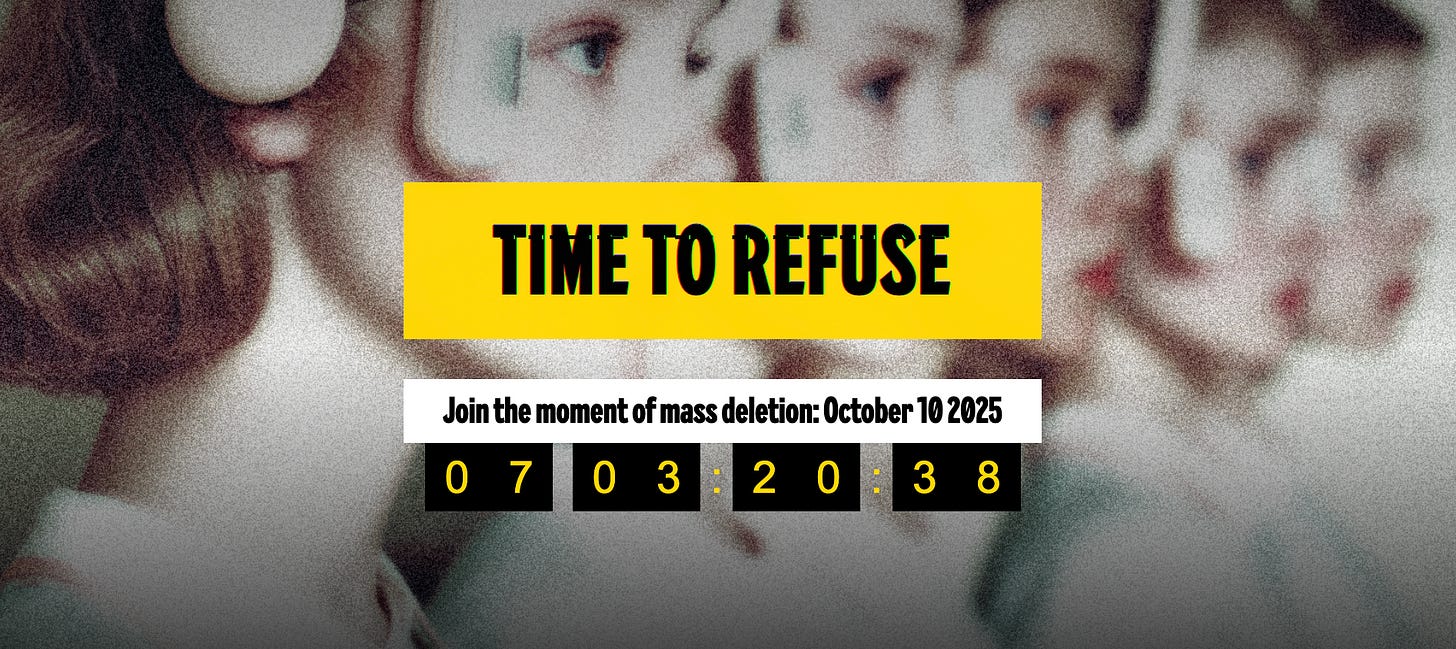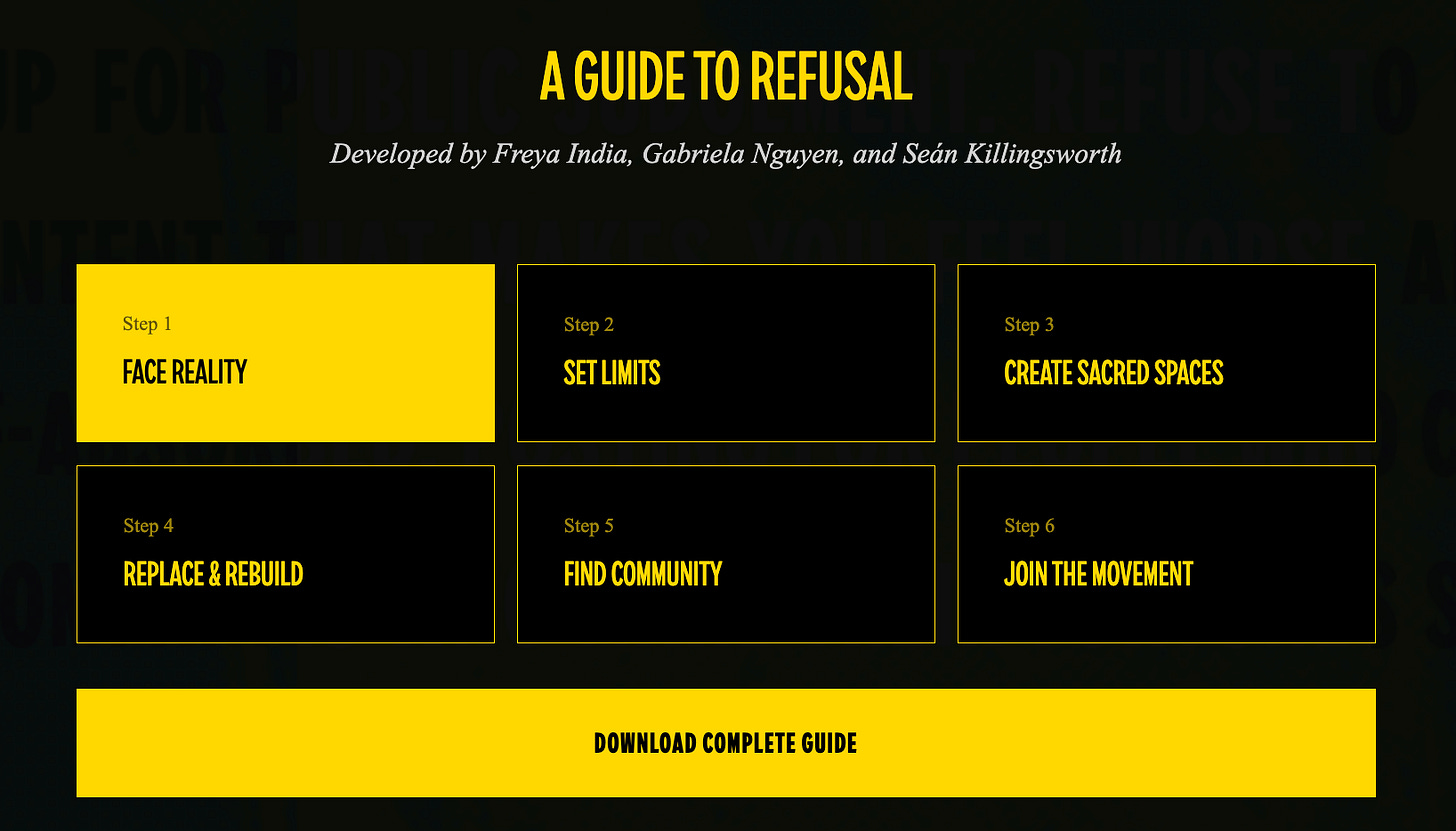TIME TO REFUSE
NYC, Join the Mass Deletion: October 10, 2025
Intro from Jon Haidt:
The movement to reclaim childhood will not be complete if it’s only led by parents, educators, and policymakers. It must also be led by young people themselves — those who have lived through this experiment-gone-wrong. They’ve been called the anxious generation (notably, by me) – and they’re refusing to let their young adult lives be taken away by tech any longer.
A number of extraordinary Gen Z authors and activists are part of a new rebellion, fighting back and creating alternative paths that bring us back to the real world. Freya India is one of the most perceptive voices of this generation, and her essays on After Babel have been among our most widely read. Along with Appstinence’s Gabriela Nguyen, Reconnect Movement’s Seán Killingsworth, and organizer Nicholas Plante — this incredible team is showing us not only what was lost, but what Gen Z can still recover.1
This new piece is a manifesto – a call-to-action for Gen Z, by Gen Z. Alongside it, the four have created a practical resource for anyone ready to reduce their time online and increase their time in the real world. I urge you to read the manifesto first, and then the guide which outlines six key steps for action.
If you’re in New York, join our Gen Z allies on October 10 for Delete Day, where young people will come together in community to actually delete an app of their choice – and take back a piece of their lives. Details here: timetorefuse.com
– Jon
TIME TO REFUSE
By Freya India
There are countless teachers, organizations and advocates trying to help Generation Z and Generation Alpha escape from the addictive trap of smartphones and social media. They are fighting against fearful overprotection, pushing to get phones out of schools, and urging parents to delay social media access until at least age 16. They are on a mission to save childhood.
But what about those of us who already lost ours?
Generation Z includes everyone born between 1996 through 2012, now aged from 12 to 27. It’s easy to focus on the younger half—those who can still have a phone-free childhood, who haven’t yet gone through puberty. For them, there’s hope ahead.
But what about the older half of Gen Z, like us? The young adults who already wasted so many of our school days on our phones? Who already watched our friendships become shallow and superficial? Whose fond childhood memories include Facetuning our prepubescent faces and bodies, talking to naked strangers on Omegle, putting our self-worth into likes and follows through our most formative and vulnerable years? Who were exposed to online porn before we even had a first kiss? Who were already overprotected in the real world, and abandoned online?
We are suffering. Almost half of Gen Z wishes platforms like X and TikTok didn’t exist. We are finally finding the words for what happened to us—what watching hardcore porn as children did to our brains, what apps and algorithms did to our attention spans, how we can’t even see our own faces properly anymore. We are realizing that this was not normal; this was not a childhood. We stumbled into this world with no age limits, no guardrails, with so little protection. And most young adults we speak to—men, women, from all different backgrounds—react with utter horror at the thought of their future children going through what they did—watching violent porn as pre-teens, objectifying themselves online, even just posting selfies to be ranked and reviewed by strangers.
For our generation, we need to acknowledge what we’ve lost. To grieve a time we never knew. We are the first to try and handle adolescence while performing and marketing ourselves at the same time. The first to never know friendship before it became keeping up SnapStreaks, community before it became Instagram and Reddit forums, or finding love before it became swiping and subscription models. The next generation has a chance, but for us, there’s no getting our adolescence back. This is where we are.
But it doesn’t have to be where we stay.
We can face that loss and turn it into resolve. We still have most of our lives ahead of us. It feels as if everyone is looking at young adults today and asking what have we done? Now it’s time for what can be done. We have grieved a time we never knew; now it’s time to build something new. We have mourned what we have lost; time to take back what we are worth.
What follows is a guide, developed with the help of Gabriela Nguyen from Appstinence, and Seán Killingsworth from Reconnect, for the millions of us who are ready for change but have been afraid or wrestled with it, and want to reclaim life in the real world, together. We believe in starting small - first minimizing use, then working toward complete freedom. On October 10th 2025, on World Mental Health Day, thousands of us will take that final step together in a mass deletion. But first, we need to get brutally honest with ourselves, face what was stolen from us, and take back our humanity.
Join the Mass Deletion on October 10th, 2025
Join thousands of us who are ready to refuse. Sign up at our website to join the mass deletion on October 10th, 2025. Start minimizing your use now, following the steps above, and then join us for the day we delete our accounts together. Every sign up is another young adult refusing to be a product. #REFUSE
My message to young adults ready for change is simple: refuse. Refuse to be a product on display. Refuse to offer your personal life up for public judgement. Refuse to waste any more years of your life scrolling through endless empty content that makes you feel worse about yourself and the world, that makes you bitter and envious and self-absorbed, posting for people who couldn’t care less about you. Refuse to give another inch of yourself to companies who make their fortunes stealing your attention and feeding you garbage.
And refuse to let it happen again. Watching Gen Alpha influencers, reading about three year-olds with smartphones, finding out nine year-olds are watching violent porn, I am overcome with this feeling that this cannot happen again. I refuse to sit by as another generation grows up this way. I refuse to call that a childhood. We have to be the adults the next generation needs.
Maybe some of you have your own children now, or dream of starting a family someday. Either way, we have to be the change, for them. We are the only ones who know what it’s like to grow up entirely online; we were the first to lose childhood this way. Maybe that makes us the only ones who know how to save it. The thought of my future daughter putting herself on public display, the thought of her feeling worthless without filters and editing apps, the thought of my future son being addicted to online porn, or too anxious to look another human in the eye—no, I refuse. Yes our generation lost a lot of time and potential, but maybe that makes us uniquely equipped. Maybe we can use that for something bigger, for the chance to save childhood.
So grieve what you have lost, and remember what is at stake. This is our ability to love, to commit, to empathize. This is our happiness, our creativity, our ability to pay attention to each other. This is our lives; this is the next generation’s only chance at a real childhood.
We have a choice here: become someone rare, live a life that’s real and different and means something, or continue handing over our lives, our creativity, our humility, our privacy, our dignity, and allow companies to rob us not only of our childhood but the rest of our lives too. We are not vulnerable children anymore—we are adults with agency. And the choice before us is between being a product or a person. Between imaginary worlds and reality. Between a life well lived and a life half-lived. Between reaching our full potential or forever battling for our own focus. This is a fight for our peace of mind, for our relationships, for our humanity.
So delete your accounts. Protect precious moments. Don’t document everything. Stand firm against online porn. Refuse to settle for this being love, for this being life. Free yourself from the pressure to post. If you wish these apps never existed, act like they don’t. If you are grieving real love and real friendship, show the world it is still possible. Decide who you want to be, and hold yourself to it. Become the example you need to see. The next generation is watching.
We can refuse to be the anxious generation. We can be the generation whose childhood was stolen by companies but who clawed back that freedom for those who came after. Who were wrenched away from real community but refused to quit until they built it back up, stronger than before. Who were raised in a world hellbent on taking away what it means to be human but held firm and did not back down.
For too long, we have been labelled the generation who lost childhood. Those days are done. It’s time for us to become the generation that brought it back.
Time to refuse.
There are many other Gen Z groups working to roll back the phone-based childhood. Groups like Design It For Us are leading protests on Big Tech’s doorsteps, and YPA, which helped lead the charge against the AI moratorium and is amplifying Gen Z voices through Ava Smithing’s new podcast, show the breadth of this movement. (See more youth-led orgs here.)




It’s time for schools to support this change. They needn’t mirror the marketplace. Instead, they should be Walled Gardens that employ all we know about human flourishing — embodied connection, developmentally appropriate methods that cultivate rather than diminish attention, and the professional stewardship that meets our fiduciary responsibilities to younger generations.
It’s time that schools become the architects of the future we want, not the reactionary institutions we’ve come to expect.
https://open.substack.com/pub/walledgardenedu/p/the-disappearing-art-of-deep-learning?r=f74da&utm_medium=ios
As a survivor of Gen Z, smartphones and social media, and now a public speaker and writer about my experiences, deletion was the only way I got my mind back in 2022. I’ve been encouraging other Gen Z, and organizations like After Babel, to push for this message. Because, as I’ve mentioned before, there are a ton of us who have grown up and already lost life. Deletion of it all is the way through it, and the way to reclaim a life lost. It is the first step of what we can actually do about it, though it doesn’t end here.
https://open.substack.com/pub/digitalelse/p/reboot-in-progress-press-any-key?r=5dvy0a&utm_medium=ios